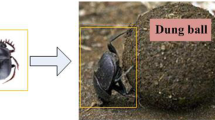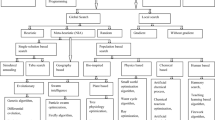Abstract
Latin hypercube designs (LHDs) are widely used in many applications. As the number of design points or factors becomes large, the total number of LHDs grows exponentially. The large number of feasible designs makes the search for optimal LHDs a difficult discrete optimization problem. To tackle this problem, we propose a new population-based algorithm named LaPSO that is adapted from the standard particle swarm optimization (PSO) and customized for LHD. Moreover, we accelerate LaPSO via a graphic processing unit (GPU). According to extensive comparisons, the proposed LaPSO is more stable than existing approaches and is capable of improving known results.












Similar content being viewed by others
References
Bratton, D., Kennedy, J.: Defining a standard for particle swarm optimization. In: IEEE Swarm Intelligence Symposium. SIS 2007, pp. 120–127. IEEE, Piscataway (2007)
Bates, S.J., Sienz, J., Toropov, V.V.: Formulation of the optimal Latin hypercube design of experiments using a permutation genetic algorithm. In: AIAA 2004-2011, pp. 1–7 (2004)
Engelbrecht, A.P.: Fundamentals of Computational Swarm Intelligence. Wiley, Hoboken (2006)
Fang, K.-T., Ma, C.-X., Winker, P.: Centered L2-discrepancy of random sampling and Latin hypercube design, and construction of uniform designs. Math. Comput. 71, 275–296 (2002)
Grosso, A., Jamali, A.R.M.J.U., Locatelli, M.: Finding maximin Latin hypercube designs by iterated local search heuristics. Eur. J. Oper. Res. 197(2), 541–547 (2009)
Hung, Y., Wang, W.: Accelerating parallel particle swarm optimization via GPU. Optim. Methods Softw. 27(1), 33–51 (2012)
Jin, R., Chen, W., Sudjianto, A.: An efficient algorithm for constructing optimal design of computer experiments. J. Stat. Plan. Inference 134(1), 268–287 (2005)
Joseph, V.R., Hung, Y.: Orthogonal-maximin Latin hypercube designs. Stat. Sin. 18, 171–186 (2008)
Kennedy, J., Eberhart, R.C.: Particle swarm optimization. In: Proceedings of IEEE International Conference on Neural Networks, vol. 4, pp. 1942–1948. IEEE, Piscataway (1995)
Kennedy, M., O’Hagan, A.: Predicting the output from a complex computer code when fast approximations are available. Biometrika 87, 1–13 (2000)
Liefvendahl, M., Stocki, R.: A study on algorithms for optimization of Latin hypercubes. J. Stat. Plan. Inference 136(9), 3231–3247 (2006)
Morris, M.D., Mitchell, T.J.: Exploratory designs for computational experiments. J. Stat. Plan. Inference 43(3), 381–402 (1995)
Santner, T.J., Williams, B.J., Notz, W.I.: The Design and Analysis of Computer Experiments. Springer, New York (2003)
Tang, B.: Orthogonal array-based Latin hypercubes. J. Am. Stat. Assoc. 88(424), 1392–1397 (1993)
Toala, D.J.J., Bressloff, N.W., Keanea, A.J., Holden, C.M.E.: The development of a hybridized particle swarm for kriging hyperparameter tuning. Eng. Optim. 43(6), 675–699 (2011)
van Dam, E.R., Husslage, B., den Hertog, D., Melissen, H.: Maximin Latin hypercube designs in two dimensions. Oper. Res. 55(1), 158–169 (2007)
van Dam, E.R., Rennen, G., Husslage, B.: Bounds for maximin Latin hypercube designs. Oper. Res. 57(3), 595–608 (2009)
van den Bergh, F.: An analysis of particle swarm optimizers. Ph.D. Thesis, University of Pretoria (2006)
van den Bergh, F., Engelbrecht, A.P.: A new locally convergent particle swarm optimiser. In: IEEE International Conference on Systems, Man and Cybernetics, p. 3 (2002)
Viana, F.A.C., Venter, G., Balabanov, V.: An algorithm for fast optimal Latin hypercube design of experiments. Int. J. Numer. Methods Eng. 82(2), 135–156 (2010)
Ye, K.Q., Li, W., Sudjianto, A.: Algorithmic construction of optimal symmetric Latin hypercube designs. J. Stat. Plan. Inference 90(1), 145–159 (2000)
Acknowledgements
The authors are grateful to the referees for their valuable and helpful comments and suggestions. The research of Hung is supported by National Science Foundation grants DMS 0905753 and CMMI 0927572. This work was supported in part by National Science Council under grant NSC 99-2118-M-006-006-MY2 (Chen) and NSC 100-2628-M-002-011-MY4 (Wang), the Taida Institute of Mathematical Sciences, Center for Advanced Study in Theoretical Sciences, the National Center for Theoretical Sciences (Taipei Office) and the Mathematics Division of the National Center for Theoretical Sciences (South) in Taiwan.
Author information
Authors and Affiliations
Corresponding author
Rights and permissions
About this article
Cite this article
Chen, RB., Hsieh, DN., Hung, Y. et al. Optimizing Latin hypercube designs by particle swarm. Stat Comput 23, 663–676 (2013). https://doi.org/10.1007/s11222-012-9363-3
Received:
Accepted:
Published:
Issue Date:
DOI: https://doi.org/10.1007/s11222-012-9363-3




